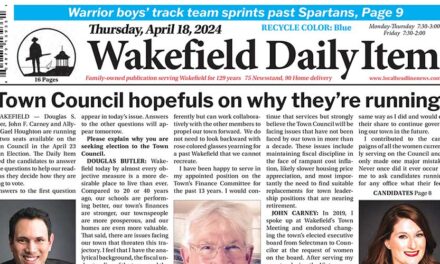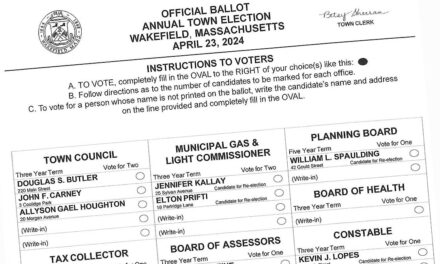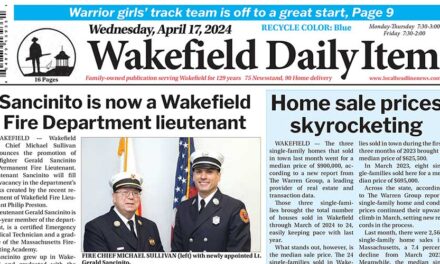Published in the January 18, 2018 edition.
By MICHAEL P. NORTON
State House News Service
BOSTON — As Gov. Charlie Baker begins to tease out his election year spending plans, the Republican governor and his partners in the Legislature are about to premise their budget proposals on the smallest projected rate increase in state tax collections in nine years.
The Baker administration and leaders of the House and Senate Ways and Means committees on Friday announced they expect tax collections to grow 3.5 percent in fiscal 2019. However, compared to their original fiscal 2018 estimate, they are counting on a 4.1 percent bounce in receipts – precisely the level of growth projected in December by the Department of Revenue, the Massachusetts Taxpayers Foundation and the Beacon Hill Institute.
The 3.5 percent estimate highlighted on Friday is tied to a $157 million increase, also announced Friday, in the state’s original fiscal 2018 estimate.
In fiscal 2010, the so-called consensus revenue estimate agreed to during the Great Recession was 0.41 percent, which Leslie Kirwan, Gov. Deval Patrick’s budget chief at the time, attributed to “the national and international financial condition” at the time. In the years since then, the annual tax revenue growth estimates have ranged from a low of 3.75 percent in fiscal 2012 to a high of 4.9 percent in fiscal 2015, according to the foundation.
While the fiscal 2019 growth rate appears conservative on paper, it comes with two sobering caveats.
Massachusetts accountants are warning a surge in fiscal 2018 collections won’t hold up in the second half stretch – January to June – of the fiscal year. If that happens, it would continue a recent trend. Presented with dismal collections in the second half of each of the last two fiscal years, state officials were forced to make major eleventh hour revenue markdowns in each of those budget cycles to avoid complete budgetary disasters.
In fiscal 2016 – Baker’s first full budget cycle – the governor and high-ranking legislators agreed tax revenues would grow by 4.74 percent, according to the taxpayers foundation, but collections rose by only 2.28 percent.
The next fiscal year, fiscal 2017, was worse. Collections rose by only 1.33 percent after Baker and the Legislature built spending plans premised on a 4.31 percent growth rate. Lawmakers had to mark down revenues by $629 million before they sent a budget to Baker for that fiscal year.
For the current fiscal year, fiscal 2018, collection estimates were marked down by $568 million last spring and state officials assumed a 3.9 percent tax revenue growth rate. While receipts have run more than $730 million above benchmark, the Massachusetts Society of Certified Public Accountants warned this month that it expects most of the above-benchmarks gains will be taken back in the short term.
The new federal tax law looms as a big wildcard as analysts struggle to get a handle on its micro and macroeconomic effects.
Why does this all matter? In a Legislature where leadership has been cautious about advancing non-budgetary bills, the annual state budget has taken on even greater importance.
In addition to consuming most of the energy in the building between January and July each year, the budget has also become a target for lawmakers to pin policy proposals that they haven’t been able to move separately. That approach may work well when the budget process goes smoothly, but when it does not that means that both spending and policy proposals are constantly changing, creating a broader environment of uncertainty.
What Baker and the Legislature are probably secretly hoping for is a year like fiscal 2015. That year the Corner Office was occupied by Gov. Deval Patrick for the first half and by Baker in the second half. The state budget was based on a 4.9 percent rate of tax collection growth, according to the foundation, and collections actually grew by 7.7 percent, largely based on big tax hauls in May and June 2015.
The second half of fiscal 2018 and first months of fiscal 2019 will unfold with the usual monitoring of spending and collections on Beacon Hill, but also in an environment in which three candidates for governor, all Democrats, will be checking in on budget developments in the runup to the November election.
A 3.5 percent tax collection growth rate will force Baker and legislative leaders to be selective about spending increases since large costs in the areas of health care, pensions, debt service and the MBTA devour most new revenues. Baker plans to file his fiscal 2019 budget in a week, on Jan. 24, but has begun to hint at spending increases.
On Tuesday, he said he’ll boost the $2 million he initially proposed for opioid addiction education in schools. On Friday, Baker is scheduled to address the annual meeting of the Massachusetts Municipal Association and will likely outline local aid increases. As a candidate in 2014, Baker pledged to increase local aid in direct proportion to the growth in state taxes, a promise his administration has held to for unrestricted local aid.




